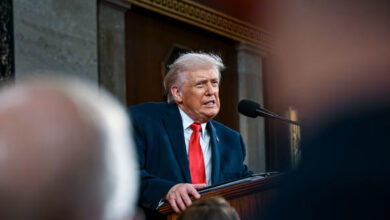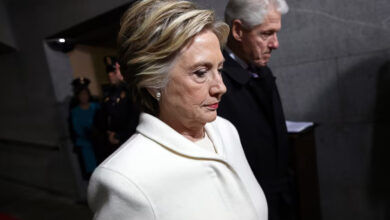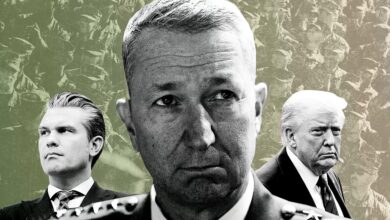
Less than a year after his lightning power grab, Syria’s president is capping his transformation from jihadist to global statesman in a historic visit to the White House that says as much about the young leader as it does his push for his country’s diplomatic reinvention.
Ahmad al-Sharaa’s meeting on Monday – the first ever visit to the White House by a Syrian head of state – will be his 20th foreign trip since appointing himself as president of Syria in January, and his second visit to the United States, following his attendance of the United Nations General Assembly in New York in September.
But this meeting will be the most high-profile and high stakes yet, a once-unthinkable encounter between the US commander-in-chief and a man who has faced American forces on the battlefield.
In May, after a brief meeting brokered by Saudi Crown Prince Mohammed bin Salman, US President Donald Trump hailed the 43-year-old Syrian leader as a “young, attractive guy” with a “very strong past,” and ordered the lifting of some of the crippling US sanctions on Syria, a country that for decades had been firmly aligned with key American foes Russia and Iran.
Yet the most stringent sanctions on Damascus remain and cannot be fully lifted without congressional approval. Al-Sharaa’s immediate goal in Washington is to push for their removal while urging Trump to pressure Israel to halt attacks on Syria and withdraw its troops from the south of the country.
His broader objective, reflected in his extensive global travel, is to reverse Syria’s isolation, a legacy of the previous regime that left the country economically devasted and diplomatically shackled to a narrow axis of allies.

Against this backdrop, the White House visit carries profound symbolic weight. Al Sharaa played basketball with top US military officials after arriving in Washington on Sunday. But in his early twenties, he encountered the US as an enemy, joining Islamist insurgents battling American forces in Iraq. Captured and later released, he crossed into Syria in 2011 and established an Al-Qaeda-backed rebel army to fight forces loyal to then-President Bashar Al Assad.
After more than a decade of a brutal conflict against Assad’s autocratic regime, Al-Sharaa ended Syria’s long-stalemated civil war by launching a surprise offensive that swiftly toppled the 53-year Assad dynasty, an Arab relic of the Cold War.
In their decades of power, the Assads aligned Damascus firmly with Moscow, relying on aid, arms and unwavering diplomatic backing. In Hafez al-Assad’s first full year in power in 1971, the Soviet Union established its strategic Mediterranean naval base in the Syrian city of Tartus. And it was Vladimir Putin’s decisive military intervention in 2015 that enabled Bashar al-Assad to survive the civil war.
The Russians, who killed scores of Syrians during their campaign to keep Assad in power, continue to retain control of their military base in Tartus even after Assad’s fall. And last month, Al-Sharaa visited Moscow to meet Putin.
As he has sought to build ties with Western nations, al-Sharaa has been careful not to antagonize Moscow.
“Engaging in a conflict with Russia right now would be too costly with Syria, nor would it be in the country’s interest,” Al-Sharaa told CBS’ “60 Minutes” in an interview aired in October.

Once sanctioned for terrorism by the West, the leader now appears to be on a global diplomatic charm offensive, bolstered by aggressive lobbying from regional heavyweights Saudi Arabia and Turkey, US allies eager to fill a power and economic vacuum left by Iran and Russia.
For the US, Syria represents both a strategic prize and a significant risk as neighboring Lebanon spirals into instability and Iraq remains a fertile ground for Iran’s proxy militias.
“The US is taking a large gamble on Ahmad al-Sharaa and Syria,” Joshua Landis, director of the Center for Middle East Studies at the University of Oklahoma, told CNN. “As (US) Ambassador (Tom) Barrack has stated numerous times, the US has no alternatives. Lebanon is a failed state according to his assessment. Iraq is deeply penetrated by pro-Iranian militias,” he added.
And despite a clear westward outlook, the former jihadist leader remains adamant on balancing Syria’s foreign policy away from conflict in an increasingly polarized world – a policy now followed by several developing nations worldwide.
“In this new era, one doesn’t align completely with any side. We saw that with (Sharaa’s) visit with Putin, who is an active ally with the Assad regime … and you see that with diplomacy on behalf of the Syrian government globally,” Natasha Hall, a senior associate at the Center for Strategic and International Studies (CSIS) said.




